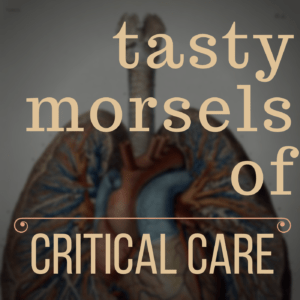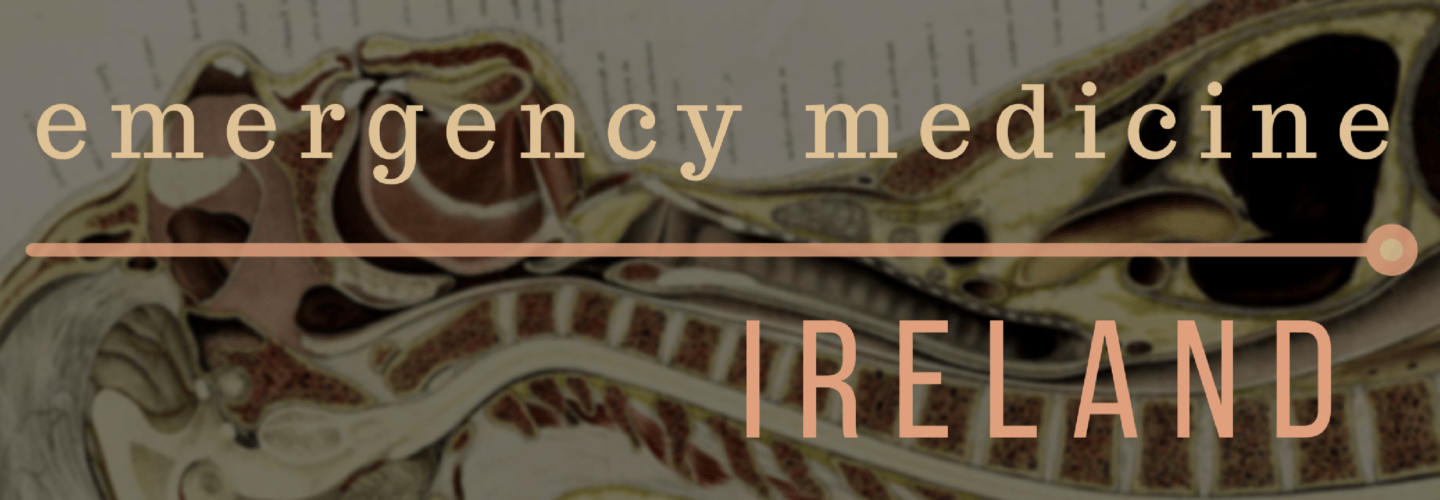The tasty morsels of critical care podcast is a series of bite size chunks of knowledge targeted at fellowship exam preparation.
A searchable table of all the posts and episodes exists below.
| Episode | Topic | System | Link |
|---|---|---|---|
| 001 | Thrombotic Thrombocytopaenic Purpura | Haem | 001 |
| 002 | Diastolic Dysfunction | Cardiac | 002 |
| 003 | Diabetic Ketoacidosis DKA | Endo | 003 |
| 004 | Transplant drugs | Transplant | 004 |
| 005 | Submersion | Environmental | 005 |
| 006 | Chylothorax | Respiratory | 006 |
| 007 | Pneumocystis Jirovecii Pneumonia | Micro | 007 |
| 008 | Decompressive Craniectomy for Stroke | Neuro | 008 |
| 009 | The ESPEN 2018 Nutrition Guidelines | Nutrition | 009 |
| 010 | Cardiac disease in pregnancy | Obstetrics | 010 |
| 011 | Tumour Lysis Syndrome | Oncology | 011 |
| 012 | ICU Sedation | Pain and sedation | 012 |
| 013 | Tracheostomy - putting it in | Procedure | 013 |
| 014 | Tracheostomy – Taking it out | Procedure | 014 |
| 015 | Acute Kidney Injury | Renal | 015 |
| 016 | Open Lung Biopsy for ICU patients | Respiratory | 016 |
| 017 | Pyroglutamic acidosis | Tox | 017 |
| 018 | Liver Transplant Part 1 | Transplant | 018 |
| 019 | Liver Transplant Part 2 | Transplant | 019 |
| 020 | ICP Monitoring | Neuro | 020 |
| 021 | Time cycling vs flow cycling | Ventilation | 021 |
| 022 | Necrotising fasciitis | Micro | 022 |
| 023 | Cardiac Pacing | Cardiac | 023 |
| 024 | The aminoglycosides | Drugs | 024 |
| 025 | Andrenocortical insufficiency | Endocrine | 025 |
| 026 | Short Bowel Syndrome | Gastro | 026 |
| 027 | Plasmapheresis | Haem | 027 |
| 028 | HIV in the ICU | Micro | 028 |
| 029 | C. Diff | Micro | 029 |
| 030 | GBS Part 1 | Neuro | 030 |
| 031 | GBS Part 2 | Neuro | 031 |
| 032 | Nutritional requirements in ICU | Nutrition | 032 |
| 033 | Pre-eclampsia | Obstetrics | 033 |
| 034 | Chemotherapy agents and intensive care | Oncology | 034 |
| 035 | When to start CRRT | Renal | 035 |
| 036 | Oxygen | Respiratory | 036 |
| 037 | Serotonin Syndrome | Tox | 037 |
| 038 | Lung Transplantation | Respiratory | 038 |
| 039 | Management of raised ICP | Neuro | 039 |
| 040 | Respiratory Monitoring | Ventilation | 040 |
| 041 | Gas Emboli | Cardiac | 041 |
| 042 | Nitric Oxide | Ventilation | 042 |
| 043 | Inotropes and vasopressors | Cardiac | 043 |
| 044 | Calcium Disorders | Endocrine | 044 |
| 045 | Chemical Biological Radiological and Nuclear exposures | Environmental | 045 |
| 046 | Abdominal Compartment Syndrome | Gastro | 046 |
| 047 | Haemostatic failure | Haem | 047 |
| 048 | Anaphylaxis | Immunology | 048 |
| 049 | Candida | Micro | 049 |
| 050 | Spinal cord injuries | trauma | 050 |
| 051 | Parenteral nutrition | Nutrition | 051 |
| 052 | Bronchoscopy in the ICU | Respiratory | 052 |
| 053 | Recurrent clotting of the filter | Renal | 053 |
| 054 | Chest injuries | Trauma | 054 |
| 055 | Salicylate Poisoning | Tox | 055 |
| 056 | Aspergillosis | Micro | 056 |
| 057 | Myasthenia Gravis | Neuro | 057 |
| 058 | Haematological Malignancy | Haem | 058 |
| 059 | Dead Space | Ventilation | 059 |
| 060 | Post Cardiac Surgery Patient | Cardiac | 060 |
| 061 | Asthma | Respiratory | 061 |
| 062 | Diuretics | Drugs | 062 |
| 063 | Respiratory Compliance | Respiratory | 063 |
| 064 | Staph Aureus | Micro | 064 |
| 065 | Cerebral Protection | Neuro | 064 |
| 066 | Solid Tumors in Intensive Care | Oncology | 065 |
| 067 | The pulmonary artery catheter | Cardiac | 067 |
| 068 | Ventilator Triggering | Ventilation | 068 |
| 069 | Sub Arachnoid Haemorrhage | Neuro | 069 |
| 070 | CRRT Modes | Renal | 070 |
| 071 | Non invasive ventilation in the ICU | Ventilation | 071 |
| 072 | Cardiorenal syndrome | Renal | 072 |
| 073 | Hepatorenal syndrome | renal | 073 |
| 074 | Dynamic LV outflow tract obstruction | Cardiac | 074 |
| 075 | Vasopressin | Drugs | 075 |
| 076 | VV ECMO | Respiratory | 076 |
| 077 | Thyroid emergencies | Endocrine | 077 |
| 078 | Hyponatraemia – diagnostic approach | Renal | 078 |
| 079 | Hyponatraemia – management | Renal |
Subscribe:
Apple Podcasts | Android | RSS | Google Podcasts | Spotify

At this stage (Oct 2020), PGY17 and still in training I have done a fair number of exams and I feel that now, pushing 40 and vowing never to do another exam, I may have finally perfected my examination technique. But that’s for another post.
I have accumulated a large number of summarised and truncated notes across two specialties (three if you include the echo stuff…) and they exists as a useful compilation of information that I felt tricky enough and important enough to create a note for.
(as an aside I have migrated to Google Keep in a big way as my main repository for these notes in progress)
Like many people on t’internet, I feel it’s somewhat of a shame to keep these hidden behind my somewhat poorly secured google account and have tried to translate them to this here forum for public appreciation/scorn. In addition the transposition of said notes from brief notary form to the longer, and better hyperlinked form is an exercise in curation and improvement itself.
Ultimately I am engaged in an ongoing project to turn these notes into spoken word in the style of the great Mark Crislip’s “Gobbet of pus” to which this podcast is a humble and greatly inferior derivative of.
The Goal
The aim here is brief, <5min episodes that address a topic in hopefully just enough detail to stick in the mind in a manner that might be retrievable in a situation of extreme stress – namely a fellowship examination. The knowledge contained will hopefully be sufficient to allow you to not look completely clueless on the ICU round when the topic of PR3+ve ANCA vasculitis comes up.
They are not designed to be comprehensive coverage of a topic and the concepts included are deliberately simplified to maximise retention. As such this hopefully will occupy the niche of “exam prep/board review” in the already somewhat crowded critical care podcast scene.
While tagged and categorised on the site to some degree, I have decided to mix and match the EM with the ICM in the hopes of upholding the shared knowledge base and skill set that the two specialties enjoy. If the ortho turns off the intensivists and the antifungals turns off the emergentologists then apologies in advance and I strongly encourage the healthy use of the “skip” button on your podcatcher/player/thingamadoodle.
While not exactly a podcast of me reading aloud the LITFL or Deranged Physiology entry, it is definitely in the category of fan fiction.
Resources used in preparation for the ICM sections:
- I used Oh’s Manual of Intensive Care as the curriculum guide. It doesn’t always teach the topic the best but by covering this cover to cover I felt confident I’d covered the curriculum
- LITFL Critical Care Compendium: These are invaluable as a clinical and an exam resource and cannot be praised highly enough. My notes are frequently shorter more simplistic versions
- Deranged Physiology: I used this when I wanted detail and background. There are a lot of rabbit holes and detail that is not within the scope of an ICM exam. But it is wonderfully written and referenced and a good source of links to PDFs of important review articles.
- The IBCC: This is of course still a work in progress but it was my constant companion as I ran loops of Maynooth in 2020.
- Irwin & Rippe: Much more of a US perspective on ICM but again useful as a canonical source of detail and pathophysiology
- Tobin’s book on mechanical ventilation: I’ve still only scratched the surface of this but it’s great
Resources used in preparation of the EM sections:
- The Oxford Handbook of EM: I had a PDF version that I heavily annotated and used as a guide for curriculum coverage. If you just read trauma and resus ad stuff you’re interested in you’ll never cover the gynae emergencies…
- Rosen’s Textbook: Huge amounts of detail and breadth and generally dipped into when that’s what I needed
- Guidelines: An extensive knowledge of up to date guidelines relevant to UK EM practice is essential for the FRCEM exam. I collated and summarised a LOT of these.
If really interested the music from the intro and outro is my own and can be found here
